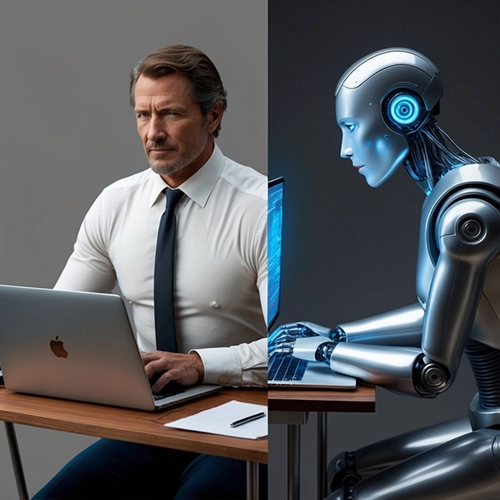As an AI speaker and author, I presented at a national conference last week and was asked – “Will AI take my job?” My response: Only if you choose not to learn and apply the new tools in this new frontier!”
Remember when transitioning from horse-drawn carriages to automobiles was a big deal? It’s happening again, folks! Only this time, the revolution is steering itself—literally. Self-driving cars, like Baidu’s Apollo Go robotaxi in China, are set to revolutionize the transportation sector. While the idea of robotaxis zipping around might give you the jitters, this tech is here to stay. And yes, jobs we once considered normal are on the chopping block. But fear not! As old roles vanish, new opportunities emerge.
From Horse and Buggy to Robo-Rides
Imagine it’s the early 1900s. Horse-drawn carriages dominate the streets, and the idea of an automobile is thrilling and terrifying. Fast forward to today: the horse and buggy are historical relics, and cars are our trusted steeds. Now, we’re on the brink of another transportation transformation. Baidu’s Apollo Go is already making waves in China, navigating urban landscapes with remarkable precision.
The Job Landscape: Out with the Old, In with the New
Sure, self-driving cars might mean fewer jobs for traditional drivers, but history teaches us that with every technological leap, new jobs arise. Just as blacksmiths transitioned to auto mechanics, today’s drivers could find new roles in maintaining and managing fleets of autonomous vehicles.
Jobs That Might Disappear:
- Taxi and Rideshare Drivers: With robotaxis like Apollo Go, the need for human drivers will diminish.
- Truck Drivers: Autonomous trucks are on the horizon, promising efficient and tireless long-haul transport.
- Delivery Drivers: Drones and self-driving delivery vehicles are set to take over last-mile delivery tasks.
Emerging Opportunities:
- AI and Robotics Technicians: Someone has to keep these high-tech rides in top shape.
- Cybersecurity Experts: Protecting autonomous systems from hacking will be crucial.
- Urban Planners: Designing cities that accommodate autonomous vehicles will become a specialized field.
Embrace the Change
Change can be unsettling, but it’s also exciting. Self-driving cars promise to make transportation safer, more efficient, and more accessible. They’ll reduce traffic accidents (many of which are caused by human error), cut down on emissions through optimized driving, and provide mobility to those unable to drive themselves.
Moreover, as jobs evolve, the workforce must adapt. Embracing lifelong learning and staying open to new possibilities will be critical. Imagine a world where you no longer need to stress about commuting, parking, or traffic jams. Instead, you could spend your travel time productively or simply relaxing. This shift in the job market not only opens up new opportunities but also promises a more convenient and efficient way of life.
What’s Next?
As we welcome self-driving cars onto our roads, it’s crucial to consider the broader implications. How will this technology shape our cities, job market, and daily lives? Will we see a rise in mobility-as-a-service, where car ownership becomes obsolete? Only time will tell.
Where From Here?
So, will AI take your job? Maybe. But history shows us that innovation doesn’t just take away—it also gives. The future of transportation is autonomous, and while we might bid farewell to some traditional roles, new and exciting opportunities await. Embrace the change, stay curious, and get ready for a thrilling ride into the future! Remember, the key to thriving in this new era is not resisting change, but embracing it with open arms.
Further Reading:
– [CNN Article on Baidu’s Apollo Go](https://www.cnn.com/2024/07/18/cars/china-baidu-apollo-go-robotaxi-anxiety-intl-hnk?cid=ios_app)







